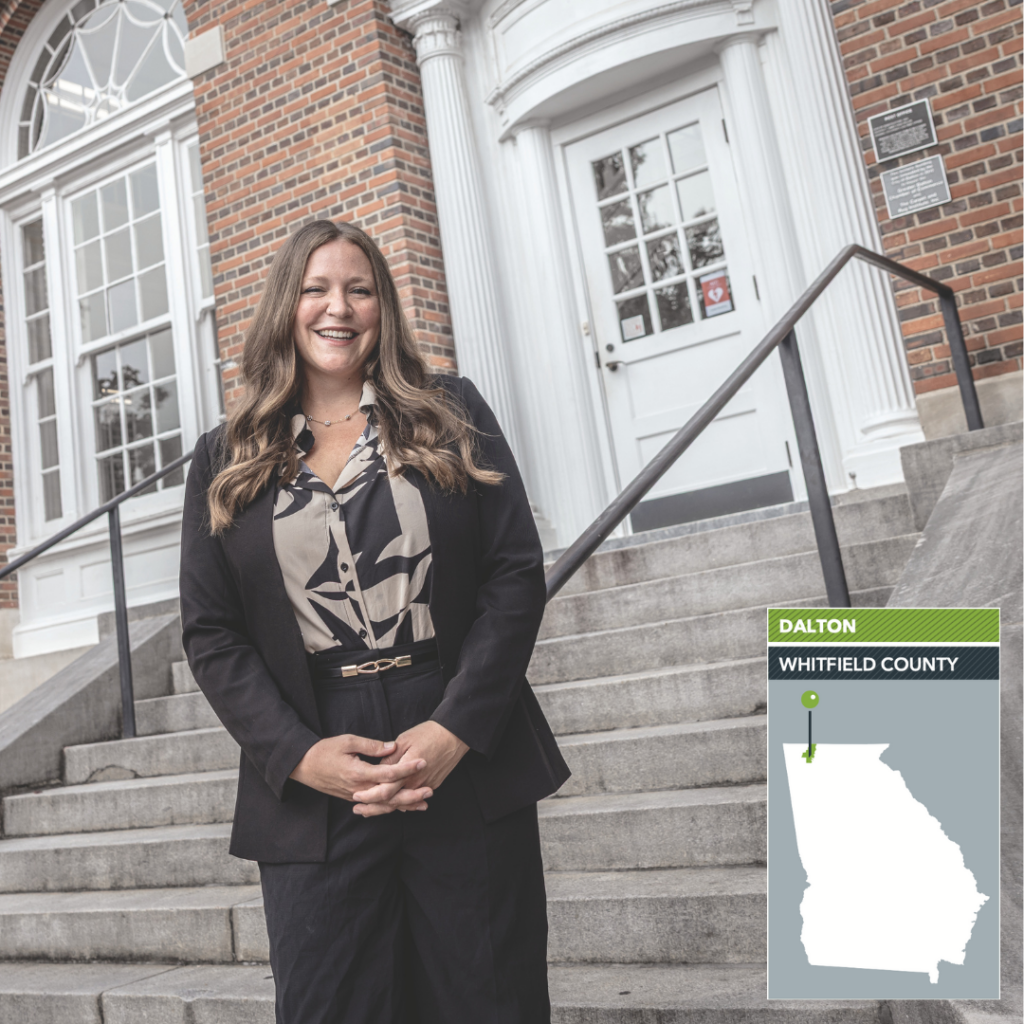Douglasville | Douglas County: Lights, Camera, Action!
Studios, Recreation, Small Business

Robust Pipeline: Chris Pumphrey, president of the Elevate Douglas Economic Partnership, in front of Lionsgate Studios in Douglasville. | Photo credit: David Parks
Amazon, Google, Microsoft, Medline and dozens of other big names already call Douglas County home, and the list continues to grow. The county’s location in the Metro Atlanta region, just 25 minutes from the world’s busiest airport with access to interstates, is also a draw for newcomers, including residents, businesses and industries. However, it’s the county’s role in the film industry that’s currently being celebrated, given the recent opening of a major studio complex that could have movies and television shows in production there for decades.
Douglas County is by no means a stranger to the stage. In fact, its history in film production dates back nearly a half-century to the filming of Smokey and the Bandit there in the ’70s. Since then, Douglas has been the site for scenes on projects such as Stranger Things and MacGyver. This new status, however, is leaps and bounds above that in terms of capacity for production.
After conceptualizing and planning since 2017, Douglas County recently celebrated the opening of The Trails, a 160-acre mixed-use development rife with opportunity. The highlight, however, is the development’s anchor project, Lionsgate Studios Atlanta, owned and operated by Great Point Studios. The $200 million complex encompasses 500,000 square feet of facilities on about 40 acres.
This is Lionsgate’s third major film and TV studio complex, the first two being in Yonkers, New York, and Newark, New Jersey. With 12 sound stages available at the Douglas site, the movie and television production company recently kicked off its first production there.

Next Generation: Douglasville Mayor Rochelle Robinson hopes development around the Town Green will draw more young people to live there. | Photo credit: David Parks
Prior to establishing the facility, Lionsgate did some location filming in Douglas for The Hunger Games movies. Onsite production services will include grip and electric, equipment, props, set building and restaurants, among others. The studio represents 2,000 new jobs for the area, says Chris Pumphrey, president of the Elevate Douglas Economic Partnership.
Development continues around the studio, across the remaining 120 acres of The Trails, he adds.
“The commercial aspects are being graded now, so the county is about to build a road to serve the rest of the development,” says Pumphrey. “The master developer is building out the internal road network, and we’re marketing to end users for commercial, retail, restaurants, town-homes, multifamily and other uses.”

Development Highlight: Rendering of Great Point Studios new film and television complex, which has Lionsgate Studios as its anchor tenant. | Photo credit: Great point Studios
Pumphrey says Douglas also has had a tremendous increase in data centers, including Google and Switch. “Also, Microsoft is just about done with their first building and should be operational this year,” he says, of the growing list of companies. “We’ve got a pretty robust pipeline for more development in that space.” Microsoft paid $13.8 million to buy 93 acres to develop almost 1 million square feet in data center buildings in Douglasville.
Relatively new to Douglas is meal-kit delivery maker Home Chef, which brought a $37.1 million investment and 690 new jobs to the county in late 2022. Home Chef is owned by Kroger and its meal kits are available in some Kroger stores. In addition, NDS, a subsidiary of Norma Group, a Danish company manufacturing industrial fasteners, opened its Southeast manufacturing headquarters and facility in Lithia Springs last year, Pumphrey says, adding 87 jobs and investing $23.3 million.
The county made adjustments last year to its targeted sectors, making a push for life sciences and healthcare companies to come to the community. “We already had the American Red Cross with the largest blood-processing facility right here in Douglasville, and we had companies like Medline and ResMed and a host of others,” says Pumphrey.

Revitalization Effort: The Douglasville Town Green will soon include opportunities to live, work and play downtown. | Photo credit: TSW
These efforts paid off, and last year Elevate Douglas announced the planned investment of Zoetis, the world’s largest maker of animal vaccinations and pharmaceuticals, now opening a manufacturing and research and development facility in Douglasville. The company acquired a 600,000-square-foot building in a Douglas County industrial park, investing $592 million and bringing 176 new jobs to the area. It is expected to be operational by the third quarter of this year.
A Downtown Focus
Douglasville grew by some 4,500 residents between 2010 and 2020, and its leaders are focused on best practices for managing that growth, including efforts to increase quality-of-life amenities. The Douglasville community last year celebrated completion of the $18 million, 2,500-seat GreyStone Amphitheater at the Douglasville Town Green, says Douglasville Mayor Rochelle Robinson, now in her third term.
The live concerts are free to the public and seats are awarded via a lottery held for each show. The city’s concert series this year includes three shows in spring and three in fall. In addition, the green space is open to the public as a park when shows aren’t scheduled.
The concert venue is just part of the ongoing Douglasville Town Green project that will soon include opportunities to live, work and play downtown, says Robinson, with planned townhomes, restaurants, shops and more coming to the area.
“We’re hoping to bring the synergy of young people back to the downtown area,” she says, noting plans to develop more shared office space for remote workers as well as small apartments and townhomes “for young people to purchase. There are a lot of older homes downtown for established families, but to have something that young people can come to and feel like [they’re in] a Midtown or a Buckhead or something – that’s what we’re trying to accomplish in the downtown area.”
Residents benefit from the county’s exemplary parks and recreation facilities and programming. In fact, Douglasville was a recent finalist for recognition from the National Recreation and Park Association. The attention was sparked by their overall parks and rec offerings, including a recently completed $25 million renovation of Jessie Davis Memorial Park, which has community football fields.
Additional parks host rugby, soccer, baseball and basketball teams. Miles of trails, passive parks and a community garden are also in the mix, says Robinson.

Exemplary Facilities: People gather at the newly renovated Jessie Davis Park to celebrate the topping out ceremony, held in February of this year. | Photo credit: contributed
More city programming, mostly free for participants, includes an after-school food program, Miracle League sports for disabled children, golf and even gaming technology such as coding, she adds.
“Very similar to a lot of our metro peers, we have a lot of growth coming into Douglasville. Things haven’t really slowed down since the pandemic, and we’ve been managing that growth ever since,” says Marcia Hampton, city manager since 2015. While the latest census numbers show Douglasville’s population at 36,000, she suspects it’s much higher.
That growth has sparked not only the need for additional housing, but also several capital improvement projects, she says. “At the end of this year, we’ll add two gymnasiums, the senior center walking trail, as well as the connection of a trailhead for a trail project we’re hoping to get connected to the Silver Comet Trail in Cobb County,” says Hampton, noting that the latter project is about five years out.

Inclusive and Accessible: Sara Ray, Douglas County Chamber of Commerce president and CEO. | Photo credit: David Parks
The city is also making changes to its zoning ordinances to allow for the types of venues residents have asked for, such as wine shops and breweries, she says.
“We’ve changed some [ordinances] on the north side of town to encourage neighborhood development, so we’re just trying to do things in neighborhoods and pocket areas to encourage smart development,” says Hampton. “We understand that we’re growing, but we want to control it and we want to control it in a very sensitive way that basically reflects what the neighborhood wants. We do a lot of community engagement.”
Creating Opportunity
Now in her 13th year at the Douglas County Chamber of Commerce, President and CEO Sara Ray says one new initiative it has rolled out is shaking up the chamber industry—a no-cost introductory membership available to any business that wants to engage with Douglas County.
“It kind of goes against the grain of how traditional chambers operate where it’s a dues membership only, and we do have that, too. But to create an inclusive space, we offer a membership that’s accessible to anybody, no matter their size or budget,” says Ray, noting 2023 was the first full year of gratis memberships. The chamber added over 500 businesses to its roll, nearly doubling membership, while also highlighting its focus on inclusivity.
“That’s something that’s very important to us. We don’t just do initiatives around diversity, equity and inclusion to check a box; it’s incorporated into all that we do,” she says, noting the Douglas County chamber has received national recognition for their inclusivity efforts and for creating this kind of opportunity for businesses to engage with the chamber.
Last year, the chamber hired LaWanna Ross for a new position solely dedicated to supporting small businesses and entrepreneurship, says Ray.
“We have a small business and entrepreneurship ecosystem strategy that she’s tasked with executing and have already started unpacking that into some programming and some mentorship opportunities,” says Ray. “We’re elevating our online presence around creating a hub for small business support, whether they’re a startup or just thinking of starting a business – all the way to those businesses that are already in operation and looking to take it to the next level.”
The chamber has also shifted the way it advocates on behalf of businesses through engagement with elected leaders on a local, state and federal level, says Ray, by using a more intentional approach to focus on issues such as public safety, healthcare or education.
“We’re leaning more into how we advocate for those areas because that is all part of the thriving economy. People want safe streets and safe places to put their businesses, so we are advocating on behalf of public safety.”
Small Town Appeal
Villa Rica Mayor Leslie McPherson, who ran for mayor after serving on the city council for nine years, says she takes great care in how she spends other people’s money, but the city has aging infrastructure to deal with, on top of “massive growth.”
“We don’t want to get overwhelmed by the growth. I did not run on an anti-growth platform because I don’t even think that’s realistic. But I do feel like we need to slow down to a degree. People want to still live here in 10 years. It’s not just about growing, but it’s how we grow.”
Villa Rica’s downtown has struggled to keep up with the growth in recent years, she says. “When you think about Main Street and your historic downtown, you realize it’s the heart of your city. And I just have a passion for it because that’s a place where you want people to go and enjoy things.
“We have a nice amphitheater. But we have lost a decent amount of business when you talk about retail and that type of thing, since COVID. And it’s not all COVID. I really want to see what we can do not just for the businesses, but we also need [to create] some revitalization to improve aesthetics downtown. I really want to see that [as] a thriving area.”
Rapid growth also affects city services such as water and sewer, says McPherson. Villa Rica straddles two county lines, and the city’s limited water production requires it to purchase additional water from Douglas and Carroll counties, an arrangement she’d like to see change.
To that end, Villa Rica is working toward becoming water-independent, says the mayor, a process she’s told could take a decade, including a full year of submitting water samples to the state. The city is considering a solution that “works almost like a recycling program where our water comes out of our wastewater plant very clean,” says McPherson.
The whole of Douglas County is ripe for continued growth as local leaders continue to update infrastructure, housing and quality-of-life amenities to make their communities even more competitive. Film production is strong, as are manufacturing and data center operations. With its prime location near Hartsfield-Jackson Atlanta International Airport, the city of Atlanta and interstates, Douglas is certainly enticing to companies looking for a new home or a place to launch a new business.
Local Flavor
Shear Surprise

Strong Fiber: Rob Scott, owner of Buddy’s Alpaca Farm, sells items like hats, socks and blankets made from alpaca yarn. | Photo credit: David Parks
North Central Georgia has become a popular locale for alpaca farms, with about a dozen currently operating there. Buddy’s Alpaca Farm in Douglas County is an urban working alpaca fiber farm owned and operated by disabled veteran Rob Scott and his wife, Abbi.
When Rob lost his job during the pandemic, he and Abbi did the proverbial pivot and completely changed their lives and their way of making a living. After much research through a special program for veterans, the couple landed on the idea of starting a small alpaca farm on their three-acre property outside Douglasville in the fall of 2021.
The couple used a mentor to lead them through the early stages of getting established and purchased their first five animals from a farm in Cartersville. The Scotts continue to rely on a professional for the annual shearing each April, as it’s important to keep separate the two grades of fibers during the process. On average, each alpaca produces three to six pounds of fiber each year, he adds.
“Right now, there’s two years’ worth of fiber stored in vacuum-sealed bags in a loft. At some point, hopefully, this year, I’ll start processing the fiber,” he says, still undecided as to what degree they’ll finish processing onsite.
“I would probably send it off to a different mill to have it spun into yarn that then would come back and we would be selling on property, which is really awesome because then people will see our seven [alpacas] and we can say this yarn came from Buddy or this yarn came from Neo.”
Depending on the stage of processing, the quality of the fiber and the market, alpaca fiber can bring from $2 an ounce to $16 an ounce, says Rob.
The resourceful farm markets a plethora of items from alpaca fibers, including socks, hats, blankets and even leggings. Once the farm’s processing equipment is installed, the Scotts will begin selling their own alpacas’ fibers, Rob says. The one local offering they now sell is alpaca “beans,” or manure that’s high in nitrogen, potassium and phosphorus.
Currently, visitors are welcome to the farm by appointment only. Tickets for the Alpaca Experience Package are $15. The farm also hosts education and entertainment events. For more information, visit buddysalpacafarm.com.
Buddy’s Alpaca Farm is a member of Georgia Grown, the Farmer Veteran Coalition and the Homegrown by Heroes program.









